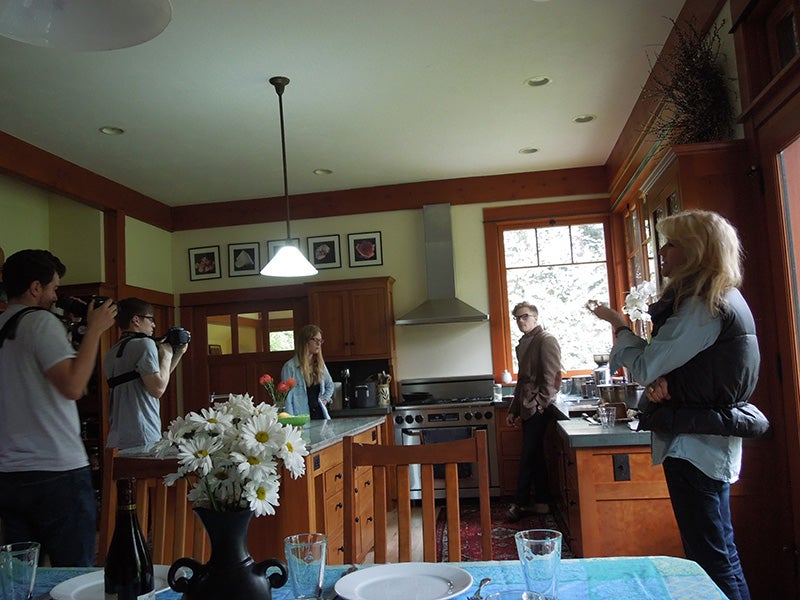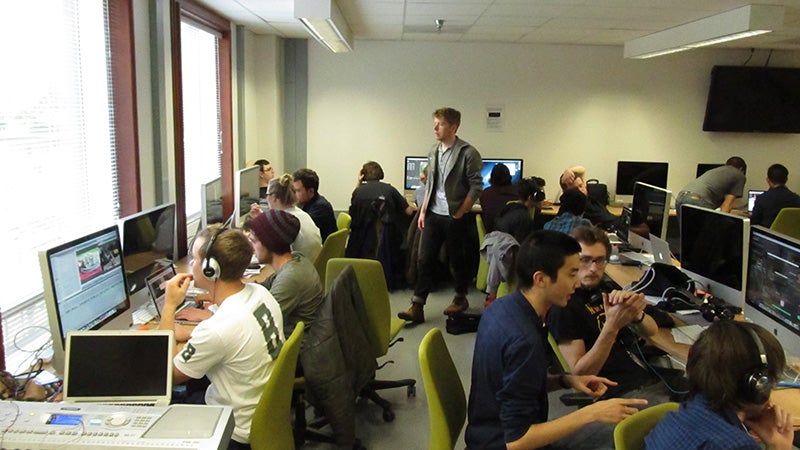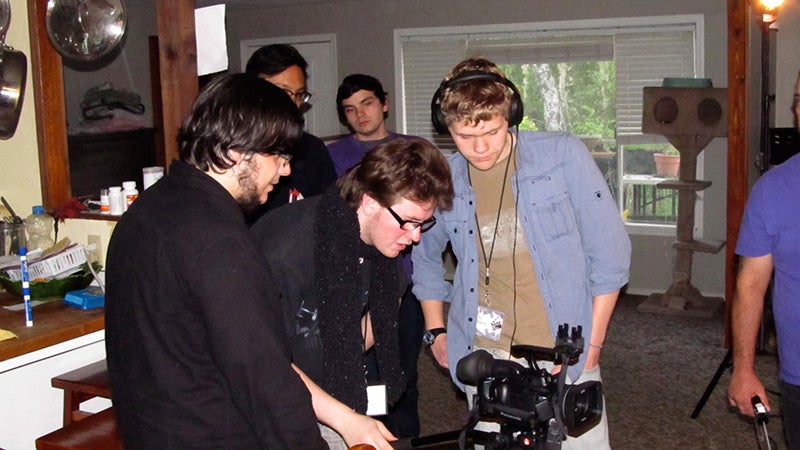When the timer starts at 5 p.m. Wednesday, April 23, participants in the Adrenaline Film Project (AFP) will have already missed their chance to rest for the next three days.
The project is a competition for the Cinema Pacific Film Festival, April 23-27, based at the University of Oregon. March 7 was the deadline for AFP applicants to have submitted a short reel of their previous work. Participants selected for the competition will have exactly 72 hours to pitch, write, film, produce, and edit a five-minute short film.
“It’s really kind of a Hollywood boot camp, if you will, how to make a creative project under pressure and on a really tight deadline,” says Larissa Ennis, operations manager for the Cinema Pacific Film Festival.

Above: A team during the 2013 Adrenaline Film Project shoots a scene in a comedy genre. Team member Zach Shivers (left to right), filmmaker-actress Claire Berger, team member Will Cuddy, actor Halden Hoodenpyl, and mentor Leigh Kilton-Smith fill out the set.
The twelve teams of three are given a certain set of shared parameters for their short film: the same prop and the same line of dialogue. The prop and dialogue are representative of a country chosen to be the focus for the festival.
“We try to incorporate the international aspect of Cinema Pacific into Adrenaline,” says Laurette Garner, an Arts and Administration (AAD) graduate student and AFP lead coordinator.
In 2013, Cinema Pacific focused on Singapore and Mexico. The line was a Singaporean phrase; the prop was a pair of chanclas, or sandals. This year, the prop and dialogue will be associated with Taiwan and Chile, the focus for this year’s festival. The groups can incorporate the two elements into the film however they please as long as the dialogue is apparent and the prop is visible.
The only distinction among the projects is the assigned genre. While one group could take the prop and line of dialogue toward a comedic route, another may be assigned to write a drama with the same thematic elements.
While the team passes each hurdle in the process, they must be approved, or green lit, by their mentors.
“They’re not allowed to move to the next stage until they are green lit, so that means a long night for all of us on that Wednesday,” says Ennis.
Past AFP mentors have included acting coach Leigh Kilton Smith, who has worked with actors such as Jennifer Aniston on the TV show “Friends” and Christopher Mintz-Plasse on the set of Kick-Ass 2. Eugene local Omar Naim, the writer and director of 2004’s The Final Cut with Robin Williams, has also been an AFP mentor.
“Just getting a professional opinion and feedback from people who work in the business is priceless and super helpful,” says Garner.
As can be expected, whenever twelve teams of three people spend this kind of concentrated time on a project, things can get hectic. During the last 29 hours, the teams edit their film in the Cinema Studies lab in the Knight Library. Next door, a room is left open for naps.
“Most people take shifts sleeping,” says Ennis. “It’s a very common sight that one or two people are editing, and the people who are not editing are sleeping on the floor.”
The student-produced short films will be showcased at 9:30 p.m. on April 26 in Prince Lucien Campbell Hall Room 180. Tickets are available from the UO Ticket Office or the Cinema Pacific Film Festival website.
“As they say, if you want something done, give it to a busy person,” says Ennis. “If you want some creative genius, push them to the edge of sanity and see what they come up with. It’s exhausting, and I think creativity is sometimes born out of desperation.”
For those participants who need further recuperation following the intensive project, Ennis teaches an academic credit course AAD 410/510 “Adrenaline Film Project.” Assignments include a reflective essay on the experience and the opportunity to re-imagine one’s short film.

Above: The EditingLab is just the filmmakers in the Cinema Studies lab in the Knight Library editing the footage that they shot that day or the day before.

Above: High school team members (from left) Travis Hodgin, Jordan Ledbetter, and A.J. Baker—from the Academy of Arts and Academics (A3) in Springfield—shoot part of a film. The team was assigned the genre of thriller. Mentor Rom Alejandro (in back wearing glasses) looks on with AFP staff member Adam Dickinson (center, back), who was also an undergraduate Cinema Studies student.
